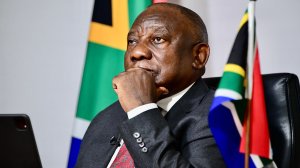For Creamer Media in Johannesburg, I’m Lumkile Nkomfe.
Making headlines: Praise for historic matric pass rate; South Africa’s economy set to escape a decade of growth inertia; And, Congo President replaces finance minister in cabinet reshuffle
Praise for historic matric pass rate
President Cyril Ramaphosa has commended the matric class of 2024 on multiple “unprecedented achievements”, which he says bears testimony to learners’ personal commitment and advances in the basic education sector, calling on government and civil society partners to provide opportunities to learners.
The class of 2024 achieved a record 87.3% matric pass rate, the highest in the country's history, while Independent Examinations Board candidates achieved a pass rate of 98.47%.
The national pass rate for the NSC increased from 82.9% in 2023.
67% of Bachelor passes were achieved by learners from Quintile 1 to 3 schools (or no-fee schools), while 319 651 distinctions were achieved.
The African National Congress celebrated the “outstanding achievements” of the matric class of 2024, saying their success stood as a testament to the transformative power of the party’s policies.
Parliament’s Portfolio Committee on Basic Education chairperson Joy Maimela said the steady improvement in the NSC average pass rate attests to the education system's maturation and bodes well for the sector's future in the country.
South Africa’s economy set to escape a decade of growth inertia
South Africa’s economy is set to forge an upward path this year after misfiring for more than a decade, boosted by steps to address growth constraints and higher consumer spending, according to top-ranked analysts.
Economists surveyed by Bloomberg expect growth of 1.7% this year, compared with 0.7% estimated for 2024 and less than 1% on average in the prior 10 years.
The economy has “a credible prospect of stabilisation” after many years of deterioration, said Elna Moolman, head of South Africa macroeconomic research at Standard Bank Group.
Factors conducive to growth include political cooperation through a coalition government formed by the African National Congress after it lost its outright majority in elections last year.
Lower interest rates, higher levels of fixed investment and the ongoing improved performance of the country’s electricity, transport and logistics sectors will also have a positive impact, said Kenneth Creamer, an economist at Wits University in Johannesburg.
And, Congo President replaces finance minister in cabinet reshuffle
Republic of Congo President Denis Sassou Nguesso replaced the nation’s finance minister in a cabinet reshuffle, after a squeeze on state finances led to a shortage of cash in the Central African nation.
Christian Yoka will replace Jean-Baptiste Ondaye, Florent Ntsiba, the director of staff in the presidency, said in a statement. In addition to the finance portfolio, Yoka will also be responsible for the budget and public assets, he said.
The change is “with a view to giving new impetus to government action in the quest for greater efficiency,” Yoka said.
Oil-producing Congo last year restructured its domestic debt and initiated a series of cost-saving measures after a shortage of cash led to the non-payment of public-servant salaries. Ondaye had announced plans in November to implement reforms aimed at boosting state revenue.
Yoka previously served as the head of the Africa department at the French Development Agency.
Ludovic Ngatse, the previous minister of budget and public assets, will become the minister of the economy and regional integration, Ntsiba said.
That’s a roundup of news making headlines today
Don’t forget to follow us on the X platform, at the handle @PolityZA
EMAIL THIS ARTICLE SAVE THIS ARTICLE ARTICLE ENQUIRY FEEDBACK
To subscribe email subscriptions@creamermedia.co.za or click here
To advertise email advertising@creamermedia.co.za or click here










